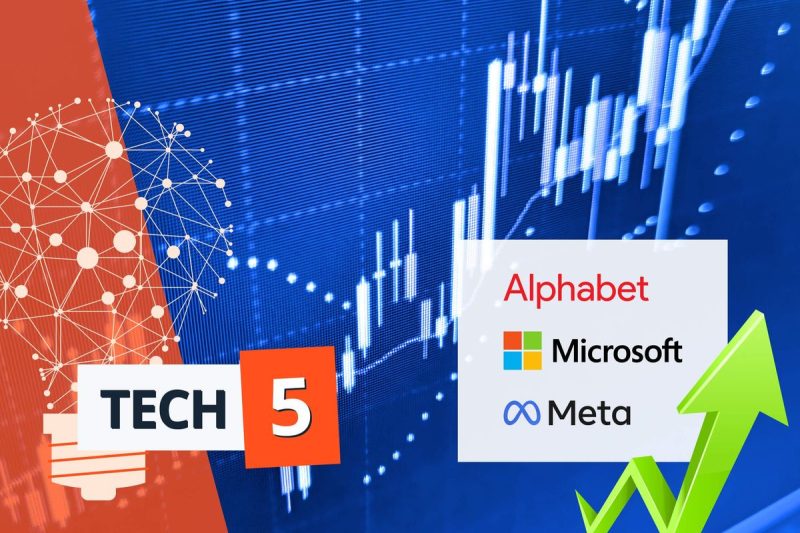
Tech 5: Alphabet, Meta and Microsoft Close at All-time Highs, Terraform Files for Bankruptcy
Terraform Labs, the company behind failed cryptocurrency project Terra, filed for Chapter 11 bankruptcy this week as part of what it’s calling a strategic move to continue expanding its business offerings.
Plus, Apple (NASDAQ:AAPL) is making big changes, and Microsoft (NASDAQ:MSFT) has cut nearly 9 percent of its gaming staff. Keep reading to learn more about these stories and other key events in the tech world.
1. Alphabet, Meta and Microsoft close at all-time highs
Alphabet (NASDAQ:GOOGL), Meta (NASDAQ:META) and Microsoft, three of the most prominent tech companies, have been driving the recent rally in the S&P 500 (INDEXSP:.INX), and this week they smashed their previous share price records just days the scheduled release of their latest quarterly earnings reports.
Alphabet shares closed at US$151.87 on Thursday (January 25), beating a previous record set in 2021. Meanwhile, Microsoft closed at US$404.87, bringing its market capitalization to over US$3 trillion, and Meta ended the day with its share price at US$393.18. All three already set new all-time highs earlier in January.
2. Terraform files for Chapter 11 bankruptcy
Terraform Labs filed for Chapter 11 bankruptcy in the state of Delaware this past Sunday (January 21), court records show. The company’s stablecoin, known as TerraUSD (UST), was designed to maintain a 1:1 peg with the US dollar, but it dramatically plunged to a measly US$0.29 in May 2022. This collapse caused a ripple effect throughout the cryptocurrency ecosystem, resulting in a loss of approximately US$40 billion in market value.
The Terra project had generated significant hype in the cryptocurrency community prior to its collapse, but the failure of UST and the subsequent downfall of Terra led to a loss of confidence in the project and its creators, and shook the faith of crypto investors. In fact, the event is regarded as a significant trigger of the so-called “crypto winter.”
In March 2023, Terraform’s former CEO Do Kwon was arrested in Montenegro trying to board a flight to Abu Dhabi. He served four months in a Montenegro prison for falsifying his travel documents. Since his imprisonment, he has been fighting against extradition to the US, where he faces fraud charges.
Terraform did not issue a press release to the public when it filed for bankruptcy. However, according to the Defiant, the company’s decision to do so was a “strategic step” in its efforts to continue operations. With its two cryptocurrencies now defunct — UST is worth US$0.03 and Luna Classic, the network’s native cryptocurrency, is worth less than one one-hundredth of a cent — Terraform has shifted its focus to offering Web3 services.
3. Apple pushes EV release date back to 2028
Apple has further pushed back the release date of its first electric vehicle (EV), this time to 2028. It has also pivoted away from building a Level 5 self-driving vehicle — a vehicle that can operate completely autonomously through any kind of conditions — to an EV equipped with Level 2 technology, on par with Tesla’s (NASDAQ:TSLA) self-driving EV models.
Level 2 EVs are equipped with advanced driver assistance systems that can handle some driving tasks, such as steering, braking and accelerating, but they still require human oversight and are not fully autonomous. These systems can assist with tasks like maintaining a safe distance from the vehicle in front, staying in the center of the lane and adjusting speed based on traffic conditions; however, the driver must remain alert and ready to take control at any time.
According to a Bloomberg report published on Tuesday (January 23), people with insider knowledge of the project say it has been wracked with problems for years, with multiple leads changing strategy, numerous delays and setbacks and several rounds of layoffs. These sources say the project may be scrapped if the company fails to deliver on time.
4. Apple to change App Store policies in the EU
Apple has maintained a tightly controlled ecosystem since the launch of the App Store in 2009, but recent changes are set to open up the platform to more competition in the European Union (EU) and give users more choice.
In response to new EU regulations known as the Digital Markets Act, Apple has reduced its App Store fees from 30 percent to 17 percent, allowing developers to keep more of their revenue. Select developers eligible for a discount will see their fees drop from 15 percent to 10 percent. Additionally, Apple will allow third-party app stores on its devices and will not collect a commission for payments made outside of its ecosystem. Instead, the company will collect a small fee of 0.50 euros from app makers for every app installation over 1 million per year.
These changes, which will be available in the next iOS update in March, are intended to make the digital marketplace more fair and competitive. They will give users more freedom to choose where they purchase and download apps, while allowing developers more control over their marketing strategy.
5. Microsoft lays off 1,900 employees in its gaming unit
Three months after Microsoft closed its US$69 billion acquisition of Activision Blizzard, a multinational video game holding company, the tech behemoth has cut roughly 9 percent of its gaming division, as reported by CNBC on Thursday.
The company primarily laid off employees with roles at Activision Blizzard, Xbox and ZeniMax. Also on Thursday, Blizzard President Mike Ybarra and Chief Design Officer Allen Adham announced that they will be stepping away from the company, according to a memo from Matt Booty, Microsoft’s game content and studio president.
According to the report, Microsoft Gaming CEO Phil Spencer said the move is one step of a larger plan to reduce “areas of overlap.’ Microsoft will provide former employees with severance depending on their location.
Securities Disclosure: I, Meagen Seatter, hold no direct investment interest in any company mentioned in this article.
